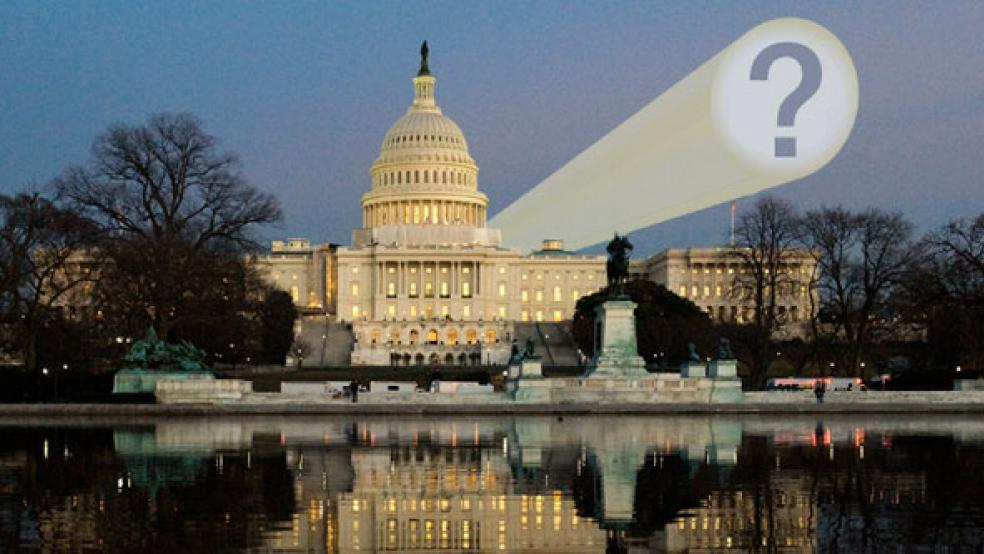The House took its first step Wednesday to avoid a government shutdown, passing a measure that funds the government through the end of the current fiscal year.
The measure was approved by a vote of 267 to 151, with most Republicans supporting it and most Democrats voting against it. The Republican measure provides $982 billion in funding for the second half of the fiscal year, keeping agencies humming when the mechanism currently funding government expires March 27.
The vote came as Washington looks to forgo forcing a fiscal crisis this month and instead turns its attention to a more deliberate debate over long-term deficit reduction.

Accepting that the across-the-board spending cuts known as the sequester are here to stay for the moment, President Obama is focusing on wooing rank-and-file Republicans in the Senate who might be interested in a deal that would pair tax reform that produces new revenues with cuts to entitlement programs.
After a series of phone calls from Obama to Republican senators who have expressed interest in that kind of “grand bargain,” he will take a group of senators to dinner Wednesday evening at the Jefferson Hotel.
Next week, Obama will make a rare visit to Capitol Hill to meet separately with the Democratic and Republican caucuses in both the House and Senate.
Entitlements were shielded from the sequester, which is designed to hit year after year for the next decade and total $1.2 trillion in cuts, meaning that other domestic and military programs were particularly hard hit. A “grand bargain” on entitlements and taxes could serve to replace the sequester.
The first step toward a broader budget discussion was ensuring that no major showdown occurs this month over simply keeping government’s doors open.
The measure passed by the House on Wednesday would provide new flexibility to the Pentagon to manage the sequester’s deep, automatic spending cuts, but would otherwise leave the reductions in place for the year.
House Democrats pushed to be allowed to vote on an alternative that would replace the sequester with a mixture of higher taxes and different spending cuts. A total of 137 Democrats voted against the bill to register their unhappiness with allowing sequestration to remain in place. Fifty-three Democrats joined 214 Republicans in voting for it. Fourteen members did not vote.
“This has an impact right at the kitchen table for the American people,” said House Minority Leader Nancy Pelosi (D-Calif.), detailing some of the impacts of the broad spending cuts.
Senate Democrats and Obama have signaled that they will seek some amendments to the Republican-authored bill to help blunt the impacts of the $85 billion in cuts this fiscal year for domestic programs as well.
But there is bipartisan optimism that those changes will ruffle few feathers and that a final version of the bill will be adopted by the end of the month.
House Republicans were largely united behind their bill, with only 14 casting votes in opposition. Even conservatives who tend to vote against all funding bills, seeking even deeper spending cuts, embraced the bill authored by the GOP leadership.
They said it adhered to a strategy advanced in a retreat for Republican members in Williamsburg in January. That strategy would force Democrats to accede to spending cuts, starting by allowing sequestration to take affect.
“So far, it actually looks like they’re following the plan,” said Rep. Raul Labrador (R-Idaho), who has been critical of Republican leaders for not forcing cuts more quickly.
House Appropriations Chairman Hal Rogers (R-Ky.), who authored the GOP spending plan, urged colleagues to vote for it on the House floor, arguing it would buy time to discuss the across-the-board cuts.
“This a bill to keep the government operating while we debate then how with sequestration,” he said. “This is not a sequestration bill.”
Next, the House and Senate will both put forward competing — and starkly different — budget plans that will lay out spending and taxing priorities for years to come.
In the House, Budget Committee Chairman Paul Ryan (R-Wis.) has promised conservatives that the budget he advances will achieve balance within 10 years. That would require spending cuts even deeper than his previous controversial plans, which took three decades to balance the budget.
More moderate Republicans have been fretting that Ryan’s promise may require outlining Medicare changes that would break a long-standing GOP promise not to trim benefits for anyone 55 or older.
Senate Budget Committee Chairman Patty Murray (D-Wash.), meanwhile, has indicated that her fiscal blueprint — the first advanced in the Senate in three years — will include not only some cuts to growing retiree health programs, but also higher taxes.
Republican leaders have insisted that, after allowing $600 billion in higher taxes to take effect in January, they will resist any new tax increases.
The budgets are nonbinding. But they will allow Democrats and Republicans to have a rare conversation about spending that does not immediately include the pressure of a looming deadline.
That pressure will come over the summer, however, when the nation once again bumps up against the federal borrowing limit, and Congress will have to decide once again whether to raise the nation’s debt ceiling or risk default.
Obama’s new outreach is a new strategy for avoiding a summer crisis. Instead of initiating negotiations with House Speaker John A. Boehner (R-Ohio) — talks that have repeatedly failed to produce agreements — he is instead approaching Republican senators one by one.
His Wednesday night dinner at the Jefferson Hotel with Republican senators will include John McCain (Ariz.), Lindsey O. Graham (S.C.), Kelly Ayotte (N.H.), Ronald H. Johnson (Wis.), Patrick J. Toomey (Pa.), Daniel Coats (Ind.), Bob Corker (Tenn.), John Hoeven (N.D.) and Tom Coburn (Okla.).
Obama also placed a call to Ryan this week.
Ed O’Keefe contributed to this report.
This piece originally appeared in The Washington Post.
Read more at The Washington Post:
Four Pinocchios for White House Claim on Capitol Janitors' Overtime




